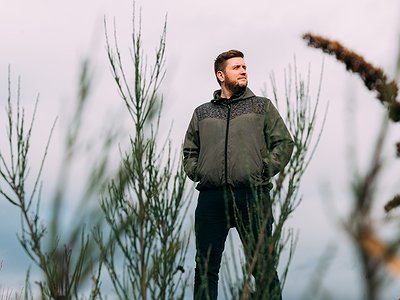Name: Simon Stokes
Nationality: British
Occupation: Producer, studio owner at Shoogle Studios / Subsine Academy
Current Release: Narisshu on Soma
Recommendations: Sapiens by Yuval Noah Harari
This book has inspired me more than any other recently as to how incredible humans really are.
Donato Dozzy – Cleo
Such a brilliant track that takes you on a journey every time.
If you enjoyed this interview with Petrichor, check out his facebook page for recent updates and a closer look behind the music.
When did you start writing/producing music - and what or who were your early passions and influences? What is it about music and/or sound that drew you to it?
I’m slightly against the grain of the standard reply to this question, in that my parents are mostly into power ballads and panpipe moods rather than the depths of jazz or obscure African music. I just had a fire for electronic music from an early age, linked closely to my early love of electronics themselves. Building music systems, linking them with doorbells and Christmas light systems and finding ways to mix two tracks together before I had any idea about DJing was my introduction to my lifelong passion.
For most artists, originality is first preceded by a phase of learning and, often, emulating others. What was this like for you? How would you describe your own development as an artist and the transition towards your own voice? What is the the relationship between copying, learning and your own creativity?
Great question and something I have thought a lot about. I have always thought of my musical development as falling into two phases – firstly of being a producer who emulates others in order to learn my craft, and ultimately as an artist who is able to express myself through that craft. The first phase lasted for many years, and ended when I took some time out to really refine a new sound for myself which manifested in the Petrichor project on Soma Records.
Of course, we are all either consciously or subconsciously referencing our influences through the music we make, but when you reach a point where there is an emotional narrative for what you’re creating then I feel you can describe yourself as an artist.
What were your main compositional- and production-challenges in the beginning and how have they changed over time?
I was in the fortunate position early on in my career that I wasn’t looking to get signed, perform or have a career in music. I was just jamming on my YouTube channel for the sheer love of it and people started to notice, then ask for demos and even book me to play internationally.
So initially I felt no pressure to create anything that people wanted to here as it was all for me. When I started to release music, I started to feel this burden when I was making music, like what will people think of it / is this what they expect from me / is this ‘cool’? And that fucked me up for a few years I think, overthinking it. I reckon I would have put out a lot more music if I had learned to overcome that early on – I wouldn’t exactly describe myself as being prolific in any way…!
By the time I started the Petrichor project I was maybe 18 years into making electronic music in one form or another, and I finally had the confidence to just put out what I wanted to make without so much consideration of others. Having the support of a label like Soma who trust me to provide them with quality music has been great.
What was your first studio like? How and for what reasons has your set-up evolved over the years and what are currently some of the most important pieces of gear for you?
Like most people I worked out of my bedroom for years. So my first ‘studio’ was a set of Tannoy Reveal monitors I got cheap at the factory near Glasgow, and a Roland MC-909 Groovebox which I learned inside out and used for everything, including live performance.
[Read our feature on the Roland TR-909]
Over the years I’ve just added hardware and rarely sold anything so now I have a decent collection of synths and some drum machines – I really love the Waldorf wavetable synths so I have two Microwave XTs (one keyboard version) and a Blofeld, they are my go-to bits of kit. And of course the Space Echo …
[Read our feature on the Waldorf Microwave]
How do you make use of technology? In terms of the feedback mechanism between technology and creativity, what do humans excel at, what do machines excel at?
I’m a believer in adopting the best of both worlds. There are some things that can’t be replaced by automated machines even in electronic music. When performing live it’s important for me to be behind my machines – tweaking them in real time adds humanity to a performance.
Production tools, from instruments to complex software environments, contribute to the compositional process. How does this manifest itself in your work? Can you describe the co-authorship between yourself and your tools?
I use a strong balance of hardware and software for music composition in the studio. Often many tracks start with a long jam session on a synthesiser which is recorded using the computer as a glorified tape recorder. Then I will hunt for something that grabs my attention. On other occasions the long jam becomes the actual structure for the track and I work everything else into it. But I also like to create chains of devices in Max for Live that work autonomously to generate patterns and sequences and let the tools be a part of the composition.
Collaborations can take on many forms. What role do they play in your approach and what are your preferred ways of engaging with other creatives through, for example, file sharing, jamming or just talking about ideas?
I have never been a huge collaborator as I’ve always found that I love the idea for it but it doesn’t click when I’m in the studio with someone. I have worked with many artists as a paid engineer but that changes the dynamic in the studio and I’m very much leading the proceedings and trying to get their ideas out there, trying to make real what they hear in their heads for their half-finished tracks for example. I make music with friends from time to time but we invariably just end up making something deliberately obtuse.



